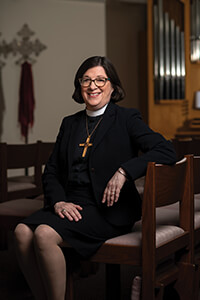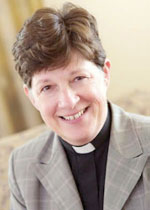Coming to terms with the times
March 24, 2015
When I’m out and about in the church, I’m often asked what I plan to do to save small congregations, reverse the decline in membership, bring young adults back to church, increase mission support, make the ELCA truly multicultural, boost our relevance in the culture and fix Congress (well, not that last one). I have no plan to do any of that by myself, but I wonder if there is a deeper concern in those questions that requires a deeper answer from all of us.
The world has changed and is changing. Residents of my mother’s retirement community who waited weeks to receive letters from loved ones serving overseas during World War II are now on Facebook and regularly use Skype or FaceTime to visit with grandchildren and great-grandchildren. Air travel that was once glamorous and rare for most of us is now, both in frequency and ambiance, a lot like taking the bus. It’s not unusual, even in small-town America, to have Jewish, Muslim and Hindu neighbors or those with no religious affiliation at all. We are in a strange new world and don’t really know how all this will shake out.

We might be tempted to overdo our efforts, to work harder and harder developing innovative programming, reading every manual on church growth, jazzing up our websites, being present on every possible social media platform. Maybe we should discover our congregation’s niche: young adults, theology on tap, justice and advocacy, care of creation, ethnic specific ministry, pet blessing liturgies, urban church, rural church, big church, small church, virtual church, home church. We have done some version of all of this somewhere across the ELCA. And good for us. We need to be brave and daring. God can use our best imagination and innovation.
Or we might be tempted to circle the wagons and hold ever more tightly to what we have left. There is much that is beautiful about our traditions and buildings and heritage. What will happen to all of that if our particular congregation ceases to exist? Who will bury our parents or us? Who will take care of the parish cemetery? This is when congregations begin eyeing visitors for their value as replacement parts.
My daughter and her significant other, who was running for county commissioner, attended a church pancake breakfast where they were swarmed by parishioners who didn’t realize he was a candidate. All they saw were young adults! Potential members! It was an uncomfortable experience.
But why do we want people to join our church? What does church mean to us? When I have asked that question, people often spoke about church as community or family. People talked about the good and important work their congregations carried out to feed the hungry or shelter the homeless. Some said the best thing about their congregations wasn’t programs but people.
It was rare that anyone mentioned God or spoke about an encounter with the transcendent. I don’t believe our people lack faith or don’t know Jesus, but I wonder if we have lost the language to speak about the love of God that has been given to us in the crucified and risen Christ. Maybe we just assume Jesus. Maybe Jesus has become like wallpaper: we know it’s there and everyone can see it, but we don’t have to talk about it.
The best thing about the church, the thing that is uniquely the church, is not programs or people but Jesus. If we as a people, and as congregations, don’t get that right it doesn’t matter how many programs we come up with.
In Christ through the Spirit, God has invited us into a deeply intimate and loving relationship with God and with each other. Being church is abiding in that love. We are God’s beloved people gathered around word and sacraments. That’s what gives us life. That’s what shapes us. That’s what sends us out into the world to do justice and to love kindness (Micah 6:8). And this must be the kind of community to which we invite others—not because we want to grow or pay for the boiler or attract young people, but because we have received this incredible life-changing gift and want everyone to be touched and claimed and transformed by it too.

